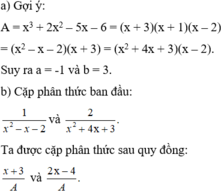Hãy nhập câu hỏi của bạn vào đây, nếu là tài khoản VIP, bạn sẽ được ưu tiên trả lời.

Ta có : 6x2 - 11x + 3
= 6x2 - 2x - 9x + 3
= (6x2 - 2x) - (9x - 3)
= 2x(3x - 1) - 3(3x - 1)
= (2x - 3)(3x - 1)

\(9,\dfrac{2}{x^2-2x}=\dfrac{6}{3x\left(x-2\right)};\dfrac{x}{3x-6}=\dfrac{x^2}{3x\left(x-2\right)}\\ 10,\dfrac{x}{x-5}=\dfrac{x}{x-5};x+1=\dfrac{\left(x+1\right)\left(x-5\right)}{x-5}\\ 11,-3=\dfrac{-3\left(x^2+x+5\right)}{x^2+x+5}\\ 12,\dfrac{x}{2x-8}=\dfrac{x^2}{2x\left(x-4\right)};\dfrac{x+1}{4x-x^2}=\dfrac{-2\left(x+1\right)}{2x\left(x-4\right)}\)

- Muốn cộng hai phân thức cùng mẫu, ta cộng các tử với nhau và giữ nguyên mẫu.
- Muốn cộng hai phân thức khác mẫu, ta quy đồng mẫu thức rồi cộng các phân thức cùng mẫu vừa tìm được.
\(\dfrac{3x}{x^3-1}+\dfrac{x-1}{x^2+x+1}\)
\(=\dfrac{3x}{\left(x-1\right)\left(x^2+x+1\right)}+\dfrac{\left(x-1\right)\left(x-1\right)}{\left(x-1\right)\left(x^2+x+1\right)}\)
\(=\dfrac{3x+x^2-2x+1}{\left(x-1\right)\left(x^2+x+1\right)}\)
\(=\dfrac{x^2+x+1}{\left(x-1\right)\left(x^2+x+1\right)}\)
\(=\dfrac{1}{x-1}\)



